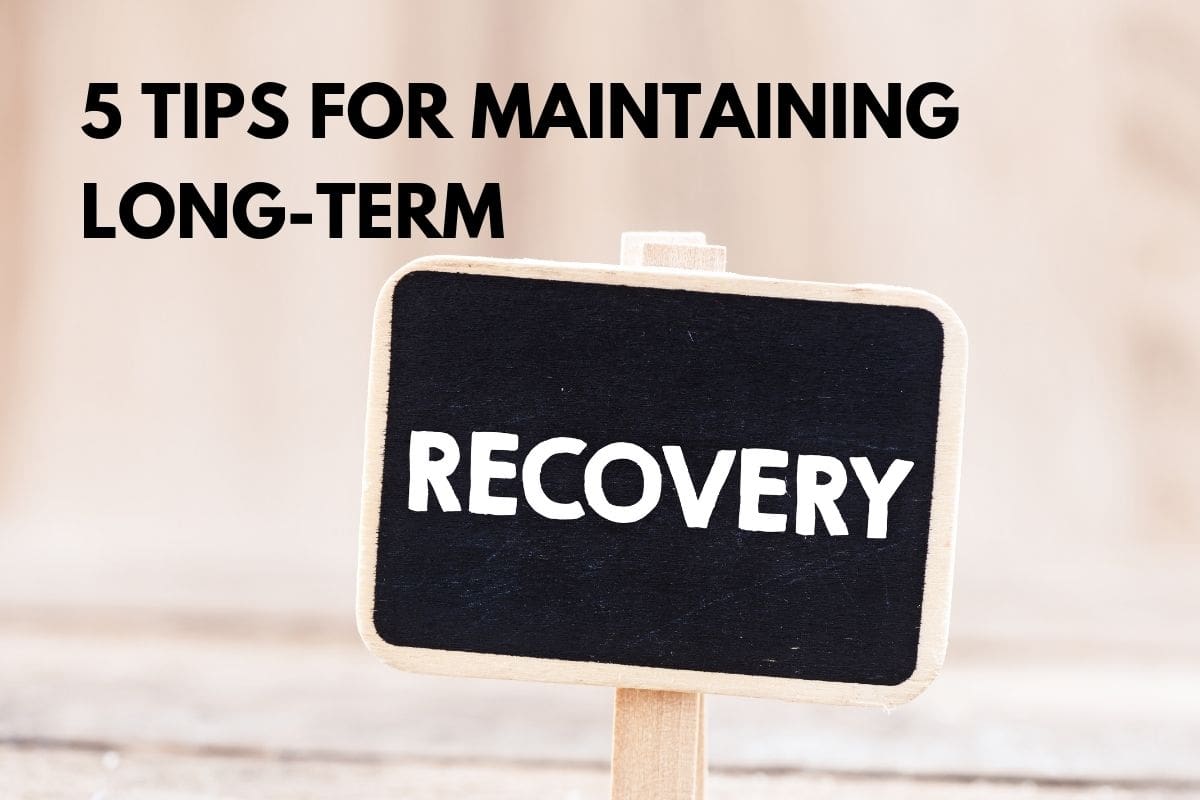Just because you’ve completed an addiction treatment program, it doesn’t necessarily mean that you’ll never drink or use drugs again. Many addiction experts agree that addiction is not curable, but it is treatable with the right resources and skills. With the right type of help, you can abstain from drugs and alcohol and live a life of sobriety.
Unfortunately, most recovering addicts are not equipped with the tools and skills needed to maintain long-term recovery. As many as 40% to 60% of addicts will relapse within a year even after completing an addiction treatment program at a licensed rehab facility.
These recovering addicts may not mean to relapse. They may simply have had a bad day or they may have succumbed to peer pressure. Many recovering addicts may even find themselves sabotaging their recovery time and time again. This is not unusual. Those who hope to achieve long-term recovery should consider following the 5 tips listed below.
#1. Attend Mutual Support Groups 
Studies show that peer support groups can be incredibly beneficial for those seeking long-term recovery. You may find it very therapeutic to share what you’re going through with others who are in similar situations. They’ll offer you a shoulder to lean on and a sympathetic ear. Those who attend mutual support groups are able to get the motivation and encouragement needed to tackle various obstacles head-on. They are less likely to relapse.
There are many different types of mutual support groups. Alcoholics Anonymous (AA) and Narcotics Anonymous (NA) are two of the most popular 12-step programs out there. There are also 12-step programs that target specific types of drug addictions, like Cocaine Anonymous (CA) and Heroin Anonymous (HA). These programs follow faith-based principles.
There are also many other alternatives. For example, Self-Management and Recovery Training (SMART) meetings are one of the newer types of mutual support groups out there. These meetings follow science-based principles rather than faith-based ones.
Most addiction experts recommend going to at least one mutual support group a week to maintain long-term recovery. With that said, you can always attend more meetings if you find them to be helpful. Some recovering addicts may even attend one meeting a day when they have just completed an addiction treatment program. If you choose to go to a meeting once a week, try to go to the same meeting. This will give you more opportunities to bond with other members.
#2. Learn About the Reasons that Caused You to Use Drugs or to Drink in the First Place
Many people don’t take the time to understand why they abused drugs or alcohol in the first place. Some people may drink or use drugs in order to deal with stressful situations and events while others may use drugs or drink in order to self-medicate.
By understanding the reasons behind why you abused various substances in the first place, you have a better chance of maintaining long-term recovery. Breaking down these reasons, however, may not be easy. You may have no idea why you started drinking or using drugs in the first place.
Addiction therapists and counselors can help you uncover these underlying reasons. They can also help you figure out how to deal from past trauma or how to change your own behaviors. Many therapists practice behavioral therapies like Cognitive Behavioral Therapy (CBT), Dialectical Behavioral Therapy (DBT) and Motivational Enhancement Therapy (MET).
Behavioral therapies can help you not only learn why you started drinking or using drugs in the first place, but also reset negative behaviors. You’ll learn how to deal with your triggers in a more positive manner. For example, you may drink whenever you’re stressed. Behavioral therapy can help you identify and recognize signs of stress, and find different techniques to destress. Some recovering addicts may rely on deep breathing techniques to relax.
#3. Make Healthy Lifestyle Changes 
Maintaining long-term recovery will be difficult if you don’t scrutinize the lifestyle that you had while struggling with addiction. If you’re aiming for long-term sobriety, you’re going to have to make some healthy lifestyle changes like:
-
- Exercising more often. You can run, go on a hike, canoe, do yoga or even go to the gym. Exercising will boost the natural production of certain neurochemicals in your body. These chemicals will make you feel good about yourself. Exercising can also reduce boredom, which is also another trigger that can lead to relapses.
- Eating healthier foods. Most addicts do not pay attention to the foods that they’re putting into their bodies. They tend to eat unhealthy foods, like junk food or sweets. Eating healthy can also make you feel less sluggish and more motivated. It can help you feel more focused. It’s also important to stay hydrated. Dehydration can lead to brain fog, fatigue and more.
- Getting a job or finding a hobby to keep yourself busy. You’d be surprised at how much boredom can cause someone to turn to alcohol or drugs again. One of the best ways to prevent relapsing is to get a job or to find something to do that you’re passionate about. Painting, drawing and even cooking are great hobbies to pick up.
When trying to maintain long-term recovery, it’s also important to start sleeping normal hours and to wake up at a healthy time every morning. Healthy lifestyle changes can make a huge difference in your quality of living. You will feel more confident in your own skin and in your own abilities.
#4. Join an Alumni Program or Live at a Sober Living Home
It’s never easy to live a life of sobriety when you’re used to being under the influence. Depending on the severity of your addiction, there’s a good chance that you’ll need a lot of support and help. Other than mutual support groups, there are two other options that you can consider: going to an alumni program or living at a sober living arrangement.
Regardless of whether you were admitted in our Partial Hospitalization Program (PHP) or our Intensive Outpatient Program (IOP), you can join our alumni programs. Our alumni regularly get together to catch up with one another’s progress. Our alumni program also provide these individuals with access to therapy and counseling services.
Our addiction experts can also help you find a sober living arrangement. Essentially, you’re renting a room in a sober living home and may be expected to take part in group therapy or do certain chores. Drugs and alcohol are not allowed on the premises, and you will be surrounded by other people who are in a similar situation as you. Being in a supportive environment can be the difference between relapse and a successful recovery.
#5. Know When to Get Help
Even if you do everything right, you might still find yourself craving your substance of choice. You might struggle to stay sober because you can’t help but obsess over drugs or alcohol even if everyone around you is supportive of your recovery.
Another key to maintaining long-term recovery is knowing when to get help. Identify signs and symptoms of a potential relapse and get help before the situation worsens. This can be anything from getting admitted to a standard outpatient program at a rehab center or scheduling in several one-on-one sessions with an addiction therapist. You may even benefit from talking to close family members or friends about your predicament. Different things work for different people.
Many recovering addicts are hesitant to get help. They’re ashamed to say that they need help or that they may still be struggling with addiction. Getting help when you need it takes a lot of courage. Those who refuse to seek help are more likely to relapse and fall back into the abyss.
We Can Help You Design a Solid Aftercare Plan
If you need help, you can rely on The Freedom Center. We offer a variety of outpatient programs for all types of addictions. We can create an individualized addiction treatment program for you depending on your needs and expectations. More importantly, we’ll make sure that you have a solid relapse prevention plan before you leave our facility. This plan will help you avoid relapses.
Maintaining long-term recovery is a lot easier if you have the right type of help and support. Here, at The Freedom Center, we can offer you all that you need to get and, more importantly, stay sober. Contact us to learn more about our programs and what we can do for you. Our admissions team can walk you through the admissions process and even verify your insurance for you.





































